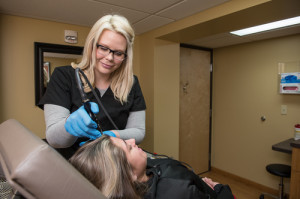Dermatology Nurse: Education and Career Information
Nursing is a specialized career path, with additional specializations designed to enhance the level of care for patients. One of those specializations is a dermatology nurse that works in the areas of wound treatments, injuries and skin diseases. This is a lucrative position that can be fulfilling if you are interested in skin treatments and helping others.
What does a dermatology nurse do?
A dermatology nurse is classified as a dermatology nurse practitioner and works with the doctor in performing surgeries and other skin-related issues. They deal with patient histories, administer skin treatments under the directive of the doctor, counsel with patients, demonstrate how to care for the skin, administer chemical peels and microdermabrasion, and are qualified to handle a higher level of care than a standard RN.
Dermatology nurses are also equipped to deal with psoriasis, skin cancer and serious acne. They perform medical exams, administer medications, and when dealing with skin cancer, focus on detection and treatment. They often educate patients on follow-up care and treatment to prevent re-occurrences. You will find them working in a hospital, private practice, cosmetic surgery facilities, clinics, dermatology offices and other areas.
How much does a dermatology nurse earn?
Dermatology nurses earn high salaries, with $78,000 on the low end, and up to $134,000 per year on the high end of the scale. These salaries fluctuate based on the location, level of education, experience, specialized certificates and demand. This is a continually growing field, and offers a number of benefits beyond that of a general care nurse. The outlook for nurses is to increase 23% by 2016.
What skills are needed to become a dermatology nurse?
There are a number of skills needed to be successful as a dermatology nurse:
Knowledge of procedures: There are a number of procedures to remember and become familiar with to be successful in this position. Due to the sensitive nature of this role, a dermatology nurse must have a firm grasp of how procedures should be carried out, as dealing with the skin is a highly sensitive matter.
Knowledge of machinery: Many of the procedures taking place will occur with specialized machinery. A dermatology nurse must be able to operate the machinery with ease, and keep up with any changes or enhancements that occur.
Critical Thinking: Being able to critically think to identify the cause of certain skin rashes and complications is important when dealing with patients. A dermatology nurse must be able to assess a situation and think of ways to alleviate the condition and any symptoms that are occurring as a result of the condition while working in tandem with the physician.
Observation: Once treatment for a condition begins, the dermatology nurse must be able to apply methods of observation to determine whether the suggested treatment plans and recommendations are working, and to stop treatment if there are adverse side effects.
Listening: Having the ability to listen to patients is important. They will be able to describe any symptoms and pain they may be experiencing, or can describe symptoms that come and go. A dermatology nurse must be a good listener and be able to capture the information they need to recommend solutions.
Communication: The dermatology nurse must be able to communicate with patients, the physician, other staff and organizations that can assist in the treatment of patients. Having a strong set of verbal and written communication skills is essential.
Administrative skills: A dermatology nurse must have excellent administrative skills to stay organized and keep track of patient records. They should also know how to operate office machines and software that will keep the office flowing smoothly and their roles on track.
Management: A dermatology nurse must have excellent management skills, as they will be responsible for managing multiple projects and clients at the same time. Proper management ensures client needs are taken care of, medicines are ordered and distributed on time, deadlines are met and any underlying issues are resolved.
Customer Service: Customer service is always a priority. The way you treat clients and coworkers is a direct reflection of the person you are. Good customer service helps clients trust you and will work to your advantage.
Organization: Staying organized when juggling a number of projects may be difficult, but a dermatology nurse must have a high sense of organization. They must be organized and careful in the administration of procedures and medicine. In order to do this, they must have things in order.
Internship Requirements
There are a number of internship requirements need to successfully complete the program. Internship hours are set by the specific school. Students have the option of completing additional hours at their discretion for experience. Students interested in becoming a dermatology nurse complete internships in dermatology settings.
Educational Requirements
The first step in becoming a dermatology nurse is to complete a bachelor’s degree program to obtain a nursing license. Coursework in the bachelor’s degree program includes:
•Physiology
•Chemistry
•Microbiology and anatomy
•Human development
As an elective, you may choose to take classes in dermatology to begin understanding the nuances of the skin.
Once this program has been completed, the student must pass the National Council Licensure Examination-Registered Nurse (NCLEX-RN) to become licensed. Once the license has been obtained, aspiring dermatology nurses should continue their education and enroll into a master’s program to become a nurse practitioner. This will be an additional 2-3 years. Once this has been completed and they have done a residency with a certified dermatology specialist, they are eligible to become certified under the Dermatology Certified Nurse Practitioner designation. The student must also obtain a license as a nurse practitioner.
This could be a financially rewarding career field for someone who is interested in skin and the prevention of skin diseases.






